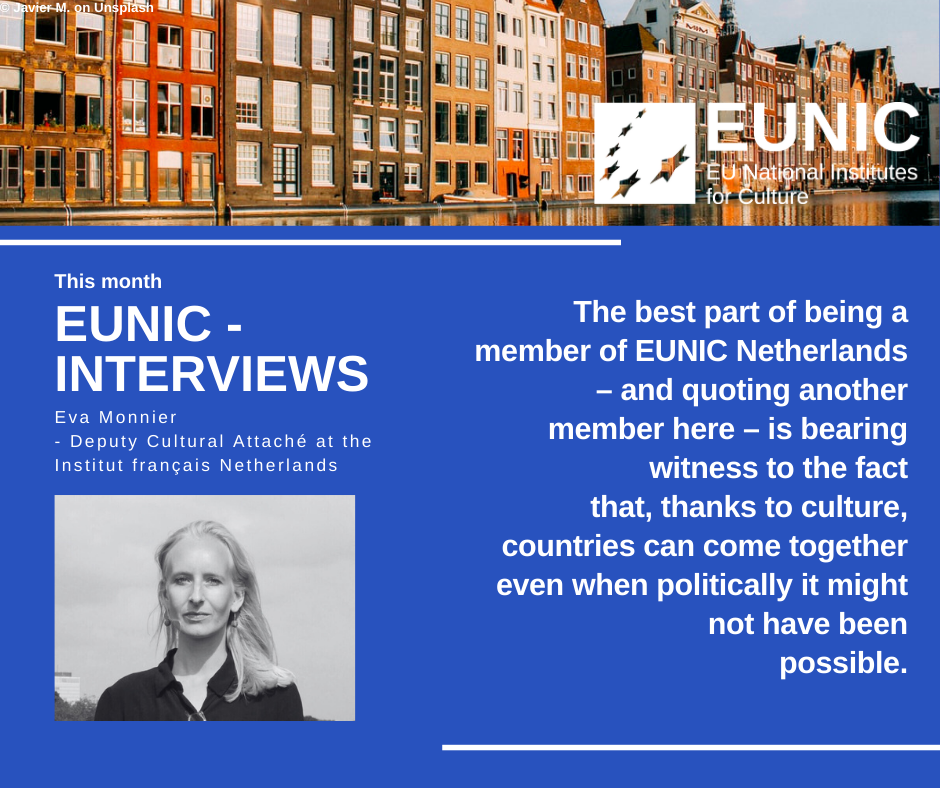This month, we’re thrilled to bring you an exclusive EUNIC interview with Eva Monnier, Deputy Cultural Attaché at the Institut Français Netherlands! Dive into her world as she shares insights about her role at the Institut Français, her impactful contributions to EUNIC, and the unique resonance she finds as a bicultural individual within the EUNIC community.

1. What role do you play in your institute/embassy?
I work as Deputy Cultural Attaché at the Institut français NL, within the French Embassy in the Netherlands. The Institut Français NL serves as a bridge between the French and Dutch cultural scenes, fostering and facilitating French-Dutch cultural cooperation in creation, research, and education.
My role, alongside my team in the artistic and cultural department, is to strengthen the position of the French creative and cultural sector in the Netherlands and to encourage dialogue addressing contemporary issues between French, Dutch, and European societies. This includes, identifying collaboration opportunities; connecting creators, professionals, institutions, and territories; stimulating the development of new partnerships; and building lasting relationships between our two countries.
To achieve these goals, we develop flagship projects, from mobility and grant programmes to public debate and professional events, revolving around strategic axes of both bilateral and European cooperation. These encompass crucial themes such as the issues of provenance and restitution, the challenge of ecological transition in the cultural and creative sector, the question of sustainable remuneration practices for artists and cultural workers, and the future of translation in the French- Dutch context.
One concrete example of a new programme I am currently coordinating in partnership with various Dutch stakeholders is the Nouveau Grand Tour in the Netherlands. This programme is an ambitious European artist-in-residency initiative supporting the development of young French artists seeking to advance their careers on an international scale. It involves a network of innovative art residencies that redefine the professionalisations of creators and makers.
Finally, we inform our overseeing authorities in Paris, the Ministry for Foreign Affairs, the Ministry of Culture and the Institut Français, about Dutch cultural policies and, conversely, we inform Dutch institutions about developments in the French art and cultural worlds.
2. How do you contribute to EUNIC?
The Institut français NL is a proud member of EUNIC Netherlands. In my role, I was specifically involved in the working group dedicated to organising the third edition of the FAIR P(L)AY series presented during the Dutch Design Week in Eindhoven.
For this edition, the Institut français NL had the pleasure of inviting Wendy Owusu, a French designer and graduate of the Design Academy Eindhoven whose work has been exhibited at prestigious institutions such as the Nieuwe Instituut in Rotterdam and the Stedelijk Museum in Amsterdam. Within this framework, Wendy shed light on practical challenges faced by young graduates. These included issues such as tax payment, the (dis)advantages of working freelance, and the pros and cons of working for free.
Working closely with Anfield, the current intern at EUNIC Netherlands, my task for this event encompassed coordinating communication activities. Leading up to the event, this involved drafting texts and creating visuals, mobilising partner networks, monitoring social media platforms, aiming at gathering both emerging and established designers to engage them in this European-scale conversation. Post-event, our efforts focused on highlighting the insights from the discussion and collecting feedback and data to measure the impact of the event.
Additionally, I contributed to brainstorming meetings for the development of the new EUNIC Netherlands strategy. These are pivotal and valuable moments, fostering the exchange of ideas and perspectives, where we collectively reflect and redefine our purpose, strategic objectives, and the common values we wish to uphold.
3. What is the best aspect about being a EUNIC Netherlands member?
The question I am most frequently asked as a French-Dutch individual is whether I feel more connected to one culture than the other. I believe any bicultural person would relate to the difficulty of answering this question. It’s almost impossible because eventually one becomes the place of an endless back and forth, dialogue, exchange, between the two cultures that eventually merge to become one.
While it might sound a bit far-fetched, I like to compare EUNIC Netherlands to this idea. It’s a crucial platform for intercultural dialogue, a tribute to diversity and complexity, a cultural space where common European interests are more important than national interests. The best part of being a member of EUNIC Netherlands – and quoting another member here – is bearing witness to the fact that, thanks to culture, countries can come together even when politically it might not have been possible.


